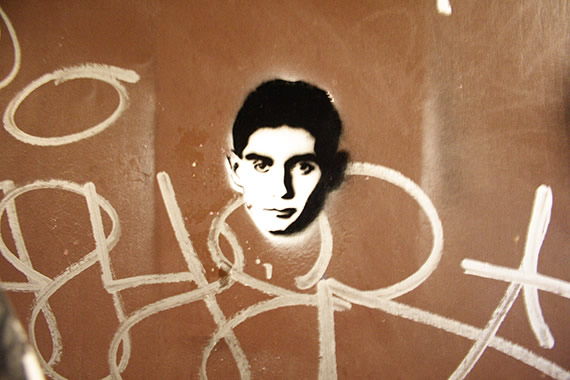Hi,
I hope that you were informed of my absence and of the need to check this blog.
Those students who have given me a Yellow Wallpaper draft or freewriting, and who want your paper back soon, so that you might work on it, should know that I'll be on campus tomorrow in the G building. At 9 I'll be in G 211 and at 1pm I will be in G 101. At other times, you'll find me in my office, G 108.
If you don't find me on campus, that means I needed more time to recover. If that's the case, or you are not on campus on Thursdays, email me and we'll see what we can do.
Thanks,
Prof. Hebert
Wednesday, April 27, 2011
Tuesday, April 12, 2011
Poster Boy, Artist + Vigilante :: Friends We Love Profile
So what do you think of this? Is this art?
Friday, April 8, 2011
Kafka's letter to his father
Reading Kafka could make you smarter

Science Daily (Sept. 16, 2009)-- Reading a book by Franz Kafka --- or watching a film by director David Lynch--- could make you smarter.
According to research by psychologists at UC Santa Barbara and the University of British Columbia, exposure to the surrealism in, say, Kafka's "The Country Doctor" or Lynch's "Blue Velvet" enhances the cognitive mechanisms that oversee implicit learning functions. The researchers' findings appear in an article published in the September issue of the journal Psychological Science.
"The idea is that when you're exposed to a meaning threat -- something that fundamentally does not make sense -- your brain is going to respond by looking for some other kind of structure within your environment," said Travis Proulx, a postdoctoral researcher at UCSB and co-author of the article. "And, it turns out, that structure can be completely unrelated to the meaning threat."
Meaning, according to Proulx, is an expected association within one's environment. Fire, for example, is associated with extreme heat, and putting your hand in a flame and finding it icy cold would constitute a threat to that meaning. "It would be very disturbing to you because it wouldn't make sense," he said.
As part of their research, Proulx and Steven J. Heine, a professor of psychology at the University of British Columbia and the article's second co-author, asked a group of subjects to read an abridged and slightly edited version of Kafka's "The Country Doctor," which involves a nonsensical -- and in some ways disturbing -- series of events. A second group read a different version of the same short story, one that had been rewritten so that the plot and literary elements made sense. The subjects were then asked to complete an artificial-grammar learning task in which they were exposed to hidden patterns in letter strings. They were asked to copy the individual letter strings and then to put a mark next to those that followed a similar pattern.
"People who read the nonsensical story checked off more letter strings -- clearly they were motivated to find structure," said Proulx. "But what's more important is that they were actually more accurate than those who read the more normal version of the story. They really did learn the pattern better than the other participants did."
In a second study, the same results were evident among people who were led to feel alienated about themselves as they considered how their past actions were often contradictory. "You get the same pattern of effects whether you're reading Kafka or experiencing a breakdown in your sense of identity," Proulx explained. "People feel uncomfortable when their expected associations are violated, and that creates an unconscious desire to make sense of their surroundings. That feeling of discomfort may come from a surreal story, or from contemplating their own contradictory behaviors, but either way, people want to get rid of it. So they're motivated to learn new patterns."
Thus far, the researchers have identified the beneficial effects of unusual experiences only in implicit pattern learning. It remains to be seen whether or not reading surreal literature would aid in the learning of studied material as well. "It's important to note that sitting down with a Kafka story before exam time probably wouldn't boost your performance on a test," said Proulx.
"What is critical here is that our participants were not expecting to encounter this bizarre story," he continued. "If you expect that you'll encounter something strange or out of the ordinary, you won't experience the same sense of alienation. You may be disturbed by it, but you won't show the same learning ability. The key to our study is that our participants were surprised by the series of unexpected events, and they had no way to make sense of them. Hence, they strived to make sense of something else."
Source: Association for Psychological Science (news : web)
Subscribe to:
Comments (Atom)
